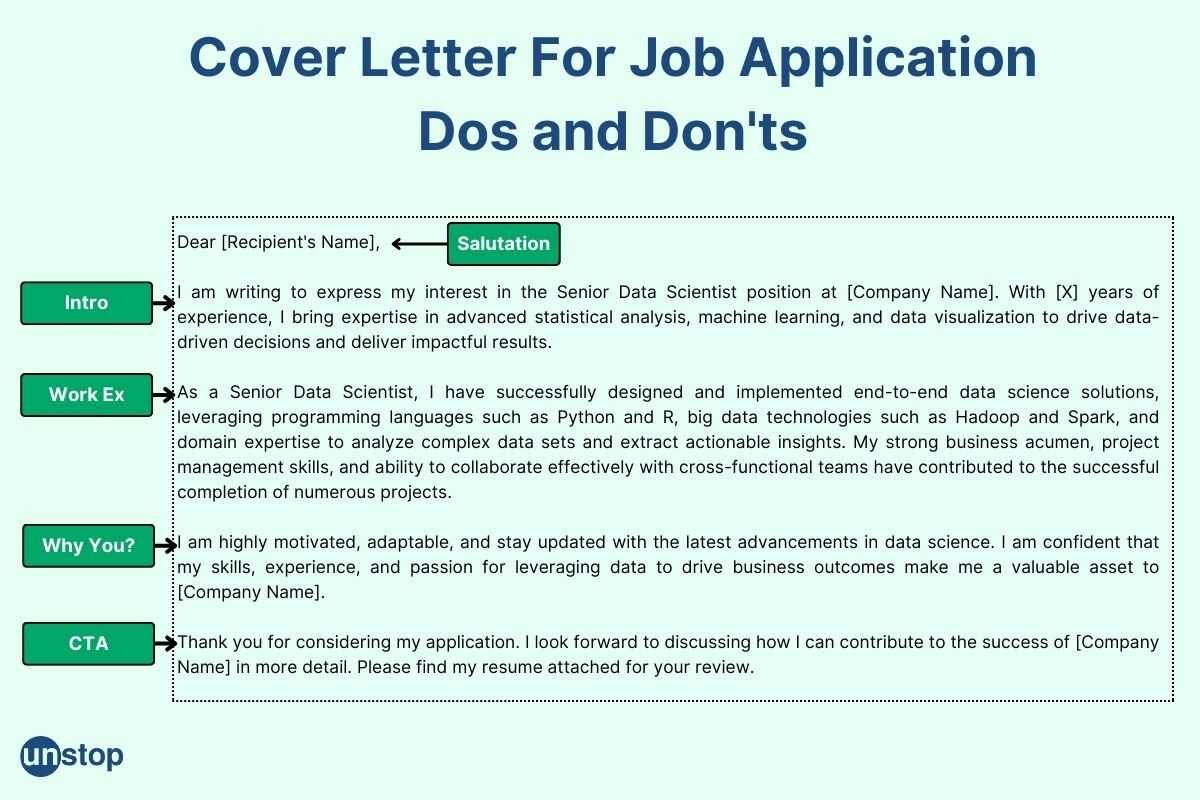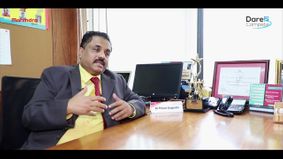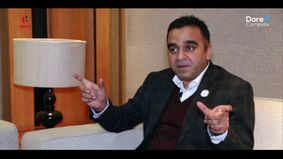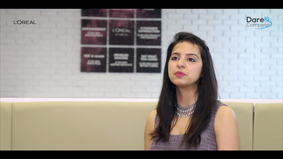- What Is A Cover Letter?
- What Should You Include In Your Cover Letter?
- How To Write An Ideal Cover Letter
- Submitting a Cover Letter
- Points to Remember
- Points to Avoid
- Sample Cover Letter
Perfect Your Cover Letter For Job Application (Sample Included)

When you're applying for a job, it's not enough to have the perfect resume. Long before you reach the interview stage, you need to prepare for the job application - by ensuring that you have an effective cover letter accompanying your job application materials (resume and email). Many candidates struggle with writing an effective cover letter. If you're one of them, then it's time to put that worry to rest and understand the whys and hows of writing a perfect cover letter.
Your cover letter is a chance to highlight your most relevant skills and achievements. It lets the hiring manager know what you can bring to the table. In fact, a well-written cover letter will boost your chances of being invited to a job interview. But what is the best approach to drafting a compelling cover letter for a job application?
Do you know? As per a survey by OfficeTeam, more than 80% hiring managers surveyed believed that cover letters are important for evaluating candidates.
Today, the majority of cover letters are sent via email or attached as a file to an online application tracking system unless the employer requests otherwise. Let's dive into more details and understand what it takes to write the perfect cover letter for a job application.
What Is A Cover Letter?
Sending a cover letter with your resume gives the employer an opportunity to learn more about your qualifications, expertise and professional experience. It's generally made up of three to four paragraphs and provides additional information to the hiring manager about the candidate. It is the first impression a hiring manager has of the candidate which can help them select the group of candidates they would like to call for the interview.
Hence, your cover letter for a job application should clearly spell out what position you're applying for and why, the skills that set you apart, your experience level, etc.
There are different types of cover letters, but the most common is an application cover letter. This is the type of cover letter that candidates write when applying for a job position. The content of this letter should always be tailored according to the position and organization.
Let's read in detail about the content of a cover letter for a job application.

What Should You Include In Your Cover Letter?
The following are the sections of a cover letter for job application:
- The header should contain the applicant's identity, address, current position and relevant contact details
- If feasible, a greeting directed to the person you are sending the letter to
- The applicant's motivation for writing the letter should be mentioned in the introduction
- Detail about your relevant qualifications, experience, skills, etc.
- Thank the reader and provide your contact information and follow-up details in the final paragraph
- End the letter with your signature
The motive behind writing a cover letter is to project yourself as the ideal candidate for the position. Hence, everything you mention in the cover letter must be written accordingly. Apart from the above, one must remember the following points while writing a cover letter for job application.
- Demonstrate Your Ability To Resolve Specific Issues: Give an example of a problem that you helped solve and how you went about it. Elaborate on your approach.
- Tell Your Tale: Researching the company on the internet can also help you gain a better idea of the company's culture. Analyze the job description and the employer's needs before writing your cover letter. A perfect candidate is one who can tailor his/her experience to the job requirements.
Pro tip: Storytelling is an excellent method to exhibit your abilities and offer potential employers a sense of who you are and how you work.
- Choose A Desirable Voice And Tone: It is important that you choose the right tone and voice for the firm you are applying to and write in a way that is consistent with your personality. This means, that the tone of your letter for a legal consulting firm is going to be rather different from that of a software company.
- Utmost Honesty: It is always recommended that you be utmost transparent in your cover letter. If you say or imply that you have a skill that you don't have, it will come back to you when you're required to elaborate upon it in the interview or anytime later.
- Don't Sound Like The Rest Of The Applicants: “A little about myself: My name is XYZ. What makes me the right candidate for your organization is that I'm a detail-driven multi-tasker and a natural-born leader.” This comes across as a generic line that can be outrightly avoided. You don't want to make the hiring manager read the same basic cover letter.
Pep it up! To make yourself stand out from the competition, use a variety of words in your cover letter. For example: Try using the word 'imaginative' instead of 'creative.' Other words that you could use to describe yourself can be self-starter, eager, inventive, proactive, steadfast, resourceful, etc.
- Establish a firm call to action in the end: In the final paragraph, give them a reason to get in touch with you. However, remarks like, ‘Contact me right away for an interview,’ are a big no! When you act in this manner, you aren't being proactive; rather, you are stepping over a line. Instead, let the call to action be polite and open-ended, implying that you are eager to provide additional information if need be and that you are eager to meet with them.
How To Write An Ideal Cover Letter That Boosts Your Hiring Chances
Now that we've covered the fundamentals, we'll walk you through the process of producing a cover letter piece by piece:
1. Select The Optimal Cover Letter Template
The goal of a strong cover letter is to make a favorable first impression. Why not use an attractive, well-formatted template to make an excellent first impression? Plenty of templates of cover letters for job applications are available online. These cover letter samples can help make things easier for you. Further, you can even get advice from some online AI software on how to improve your content.
2. Begin With A Powerful Header
You need an effective header for every cover letter you write. Hence, it is important to keep your header relevant to the position you are applying for. Every header must contain your personal information, date of writing, and the hiring manager's name. However, to make the headline more prominent, you can also include your social media profiles, the title of the position you have at your current job, your reference number (if any), etc.
3. Polite Salutations To The Human Resources Manager
Most candidates use "To Whom It May Concern," and it's perfectly acceptable. But you may also do some research on the recruiter or the recruiting manager before writing your cover letter for job application. If you address the said person properly, it will help to catch the attention of the recruiter and reflect that you have done your homework. Recruiters prefer it if you use their full name or a courtesy title when you address them. Like the header, the salutation is influenced by the kind of organization.
4. Begin With An Intriguing Intro
When you're looking for a job, it's extremely important to make a good first impression. Recruiters receive a large number of applications, sometimes in tens of thousands. There's a good chance they won't read your cover letter from beginning to end.
As a result, it's critical that you grab their attention right away. In 1-3 sentences, explain why you're interested in the position and why you'd be a good fit. Don't describe where you saw the posting or who you know at the company; just get to the point.
Why you're a wonderful candidate should be discussed in more detail in the second paragraph, not in this one. To get your letter off to a good start, simply list a couple of the most important points here. It's important to remember that a recruiter may compare your cover letter and CV.
5. The Next Paragraph Explains Why You'd Be A Good Fit For The Position
Next, use one or two specific examples to demonstrate why you'd be an excellent fit for the job position. Was there anything you performed in a previous job that would be useful for this one? Which of your past endeavors would be of use to the new business? Describe how your previous experience will help this company flourish. This is a great place to mention noteworthy professional achievements, highlight your soft skills and showcase how you're a strong candidate.
However, remember to not turn this into a snapshot of all your career highlights, or past experiences. This also isn't the space to mention former academic achievements. Only include relevant qualifications and experience - ideally from your current position.
Simply put, demonstrate your value to the team while remaining humble about your credentials. Let the prospective employer know in this paragraph that you're really pleased about the opportunity.
6. Third Paragraph Explains What Makes This Company A Good Fit for You
Let this potential employer know that you are serious about your professional development in the third paragraph. What is it about the business that intrigues and impresses you? How does it align with your career path? Is there something you care deeply about that is also in line with the company's objectives?
When a candidate is applying for a position at a firm, this is a great opportunity for them to demonstrate how their personal values match up with the company's appropriate goals.
7. Conclude With A Compelling Call To Action
It's time to wrap up your cover letter by writing a final sentence or two.
The closing paragraph should be brief and include the following:
- It's time to wrap up anything that wasn't covered in the preceding sections. Are there any other points you'd like to make? Is there anything else the hiring manager should know before making a decision? Include it in your writing.
- Express gratitude to the recruiting manager for their time. As long as you don't come across as desperate, being polite is never a bad idea.
- A call to action at the end of the cover letter is a good idea. If you haven't already included a call to action at the end of your letter, now is the time. You should put pressure on the hiring manager to act, and also include the must-have contact details, making it easier for recruiters to get in touch.
Submitting a Cover Letter
A cover letter is submitted along with the resume via email or by post as per the company's requirement. But before you submit the cover letter for job application, you must confirm the following:
- No mistakes have been made in your cover letter or CV.
- The language used is professional and not casual.
- The first line of the cover letter must be catchy as it grabs the attention of the reader.
- You may use the keywords mentioned in the job description and company information to make your cover letter pop up instantly whenever these critical terms are searched. In the case of a large volume of applications, organizations often scan cover letters submitted online manually, or through AI, for keywords and special skills. Be sure to include both in your letter.
- You may also tell stories filled with examples that meet the needs of the position and help you stand out as an individual to the potential employer.
Points to Remember
Let's sum up what we've learned so far about writing the perfect cover letter:
- The purpose of a cover letter is to persuade the hiring manager of your qualifications in a 250-400 word document.
- In addition to your resume, you should include a cover letter in your application.
- The opening paragraph of your cover letter should immediately pique the hiring manager's interest and hold it until the very last sentence.
- In your cover letter of job application, make sure that you address two primary points: why you're an excellent candidate for the position and why you're excited about the prospect of working for the organization to which you're applying.
- Lastly, always remember that the bulk of your cover letter's content should be factual, free of flowery language, and broad generalizations.
Points to Avoid
Let's take a look at some common cover letter mistakes that you should avoid:
Keeping it generic: Hiring managers are likely to cast aside a generic cover letter that is not tailored to the job role or organization. Be sure to include the requisite skills for the job you're applying for.
Not highlighting relevant experience: The letter should showcase why you're a suitable candidate for the role. Thus, it's important to include relevant experience - remember, this is not a space to include everything, from academic qualifications to all the work you did in the current company. Make sure you mention only the relevant experience.
Not being precise: A cover letter should not be longer than one page, or 400 words. Be precise in your writing, and only elaborate on points that deserve due attention.
Silly errors: Make sure your copy is not riddled with grammatical errors or silly mistakes. Such errors hamper your image as a strong candidate. You can avoid these by employing tools for spellcheck and grammar check.
Sample Cover Letter For An Ideal Job Application
Here's a sample cover letter for the job application that can refer to:
|
Your Name Street Address City, Zip Code Email/Phone Number (Date) Company Details Name Address Zip Code Dear Mr. (Name), I've written to convey my interest in the programming position advertised in (Company Name). Along with my letter and resume, I've enclosed a fully-completed job application and three professional references as per your request. In my opinion, I am a strong contender for the post because of my extensive technical expertise and education. In order to be successful in this position, I'd bring the following skills and abilities: I've worked on a number of real-world apps. I'm always looking for new ways to improve. All clients benefit from my great customer service contributions. I'm well-versed in all phases of software development, thanks to my Bachelor of Science in Computer Programming degree. In addition, I've gained expertise in picking up and using new technology when the situation calls for it. Please check out my résumé for further details about my work history. If you have any questions or concerns, please feel free to email me at (email id) or call me at (phone number). I appreciate you taking the time to look over this. I'm excited to discuss this job opportunity with you. Sincerely, Your Name (signature) |
Job search can be stressful - but we hope the above article will help you write a good cover letter that lands you your dream job.
You might also be interested in reading:
I’m a reader first and a writer second, constantly diving into the world of content. If I’m not writing or reading, I like watching movies and dreaming of a life by the beach.
Login to continue reading
And access exclusive content, personalized recommendations, and career-boosting opportunities.
Subscribe
to our newsletter














Comments
Add comment